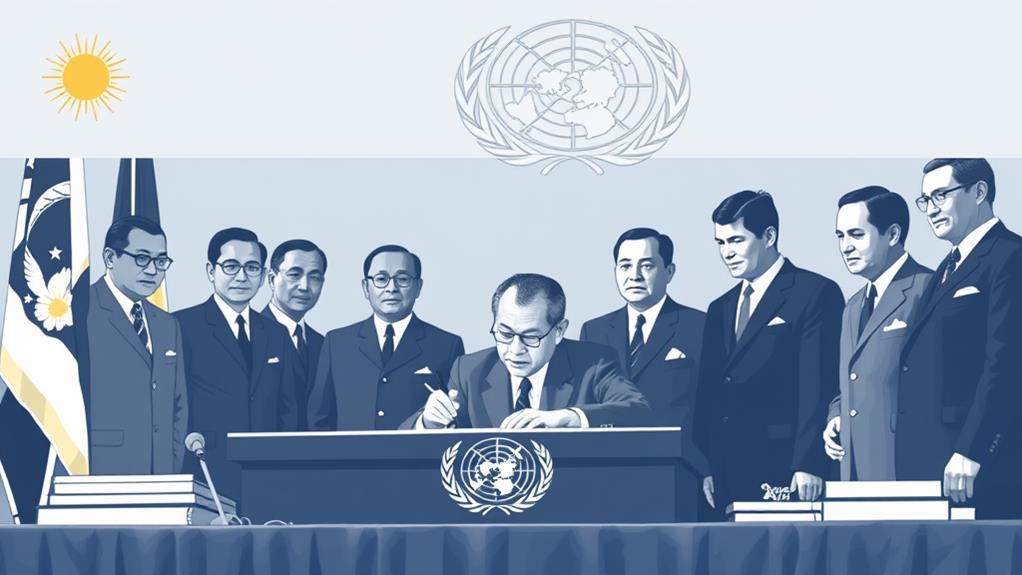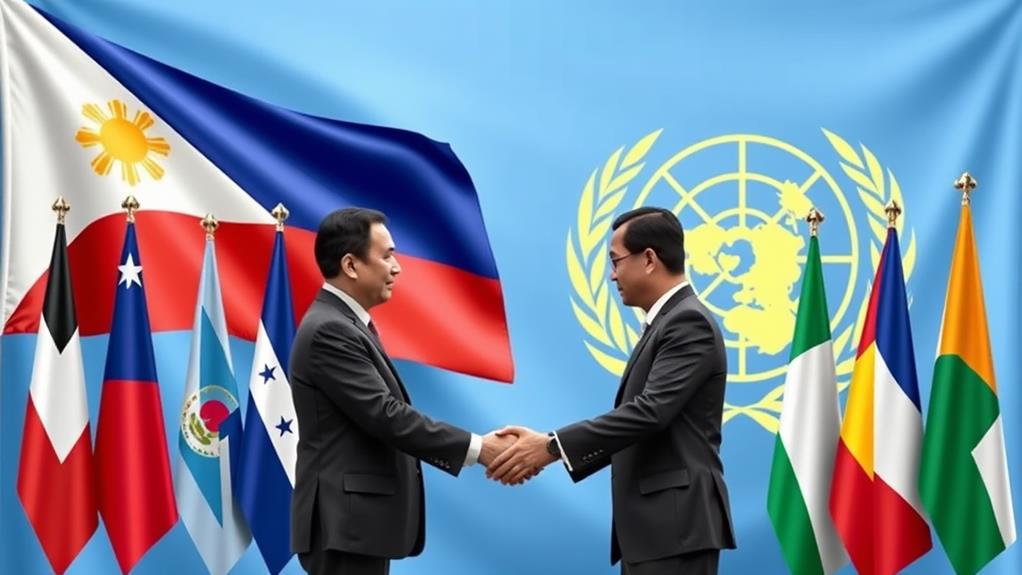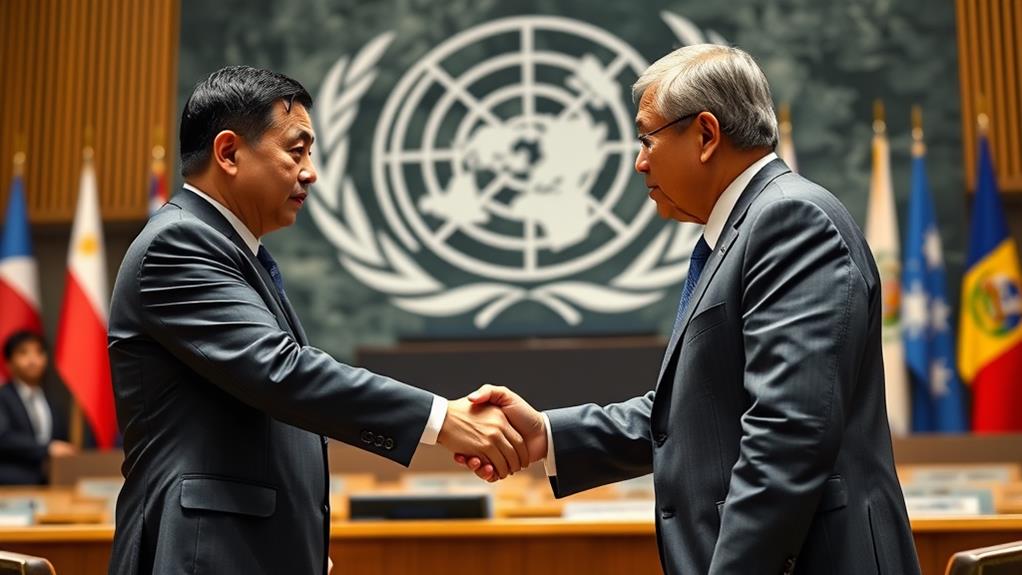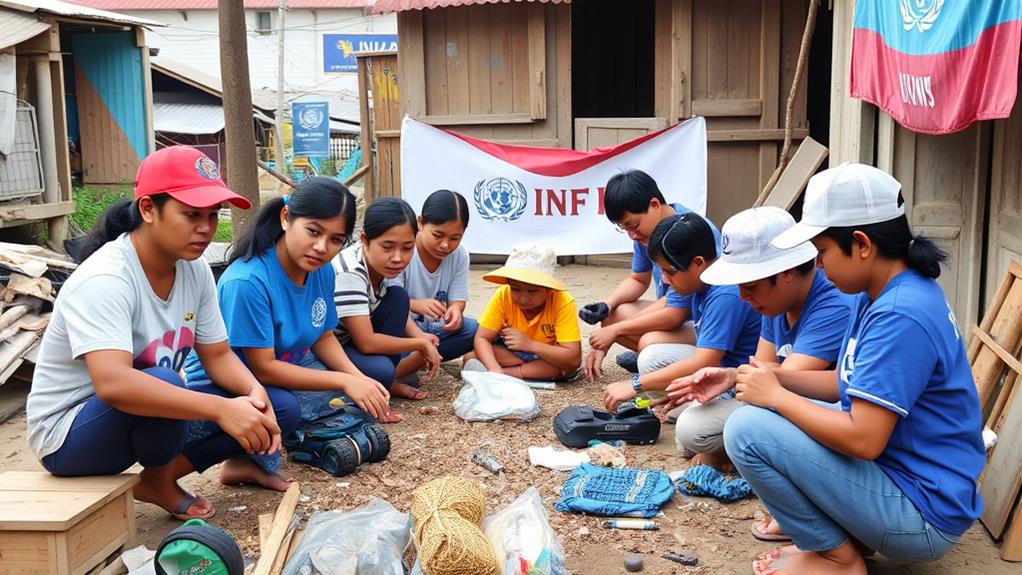The Philippines has been a key player in international diplomacy since its founding membership in the United Nations in 1945.
As one of the 51 founding members, the Philippines has held the UN Security Council presidency seven times, demonstrating its leadership capabilities. In 1949, General Carlos P. Romulo became the first Asian president of the UN General Assembly, setting a precedent for future leadership roles.
The country has actively participated in UN peacekeeping missions to promote peace and stability globally. The Philippines has also been a strong advocate for the Women, Peace and Security agenda, recognizing the critical role of women in conflict resolution and peacebuilding.
Additionally, the country has collaborated with UN agencies on sustainable development and humanitarian priorities, such as poverty reduction and disaster response.
The Philippines aims to advance human rights, sustainable practices, and inclusive governance through its continued engagement with the UN. By doing so, the country reaffirms its commitment to global peace and development.
Founding Membership and Early Years

The Philippines and the United Nations: International Diplomacy
Founding Membership and Early Years
The Philippines was one of the 51 founding members of the United Nations, signing the UN Charter in 1945. This marked the beginning of the UN's operations, and the Philippines was one of only four Asian nations to sign the charter, alongside India, China, and Thailand.
The Philippines' involvement in the UN dates back to 1942, when it signed the Declaration by United Nations. This declaration laid the groundwork for the establishment of the UN in 1945.
General Carlos P. Romulo played a pivotal role in the UN's formation, serving as the Philippine delegate to the UN Organization Conference in San Francisco and later as the Philippine ambassador to the UN from 1946 to 1954.
Romulo became the first Asian to serve as president of the UN General Assembly during the Fourth Session in 1949.
The early years of the Philippines' partnership with the UN were marked by significant contributions. The UN provided financial and technical assistance to help the Philippines recover from the devastating effects of World War II.
This collaborative effort set the stage for a longstanding relationship built on mutual support and cooperation.
Leadership Roles in the UN
The Philippines' Leadership Roles in the UN
The Philippines has taken on various leadership roles within the United Nations, demonstrating its commitment to global cooperation and diplomacy. Carlos P. Romulo was the first Asian to serve as President of the UN General Assembly's 4th Session, marking a significant milestone.
The country has consistently demonstrated its capacity for leadership within the UN system. The Philippines has held the presidency of the UN Security Council seven times, with key figures such as Jacinto Castel Borja and Lauro Baja Jr. playing pivotal roles in maintaining international peace and security.
More recently, the Philippines was elected as Chair of the 63rd session of the Committee for Programme and Coordination (CPC), a subsidiary organ of the Economic and Social Council (ECOSOC) and the General Assembly.
Director Adela Dondonilla represented the Philippines in this chairmanship, overseeing and steering negotiations on the Secretary General's work programme and its budgetary implications.
These leadership roles highlight the Philippines' proactive engagement and influence within the UN, reinforcing its dedication to collaborative and strategic global governance.
Contributions to Global Peace

The Philippines' Commitment to Global Peace
The Philippines has been an active participant in United Nations peacekeeping missions and initiatives, demonstrating its commitment to maintaining international peace and security. Since 1963, the country has consistently contributed troops to UN peacekeeping operations. This dedication is reflected in the country's cultural heritage, where values of community and harmony are deeply rooted.
Guiding Principles and Initiatives
The Philippines' role in peacekeeping is guided by the policy recommendations of the Philippine National Council for UN Peace Operations. One key initiative is the deployment of female peacekeepers, with 15 Filipino women currently serving among the 161 Filipino peacekeepers in UN missions.
The country is also actively promoting the agenda of Women, Peace and Security, recognizing the crucial contributions of women in peace negotiations and their roles in shaping peace narratives.
International Commitments
The Philippines supports key international instruments, including the Convention on the Elimination of All Forms of Discrimination Against Women (CEDAW) and the Sustainable Development Goals, particularly Goal 5 on gender equality.
These efforts underscore the country's steadfast commitment to global peace, reflecting its belief in the importance of collaborative international action to address complex global challenges.
Engagement in UN Agencies
The Philippines has been an active member of the United Nations since 1945, engaging with various UN agencies to address development, peacebuilding, and humanitarian priorities.
The country recognizes the importance of sustainable practices and environmental conservation, as seen in initiatives like eco-tourism, which promotes responsible travel and local engagement, showcasing the nation's natural beauty and cultural heritage.
The Philippines is a significant partner with multiple UN agencies, each focusing on specific areas of need.
The United Nations Development Programme (UNDP) has been pivotal in supporting the Philippines' development agenda since 1965, working closely with local authorities to address pressing issues like poverty, gender inequality, education, and governance.
The country collaborates with specialized agencies to tackle food security and hunger, such as the Food and Agriculture Organization (FAO) and the World Food Programme (WFP).
These organizations have provided critical support, including nutritious meals and livelihood programs, particularly for those affected by natural disasters and conflict.
The UN Country Team in the Philippines, comprising 17 agencies, funds, and programmes, ensures a coordinated approach to addressing the country's needs.
This collaborative effort includes entities like the World Bank, the International Labour Organization (ILO), and the United Nations Children's Fund (UNICEF), all working together to enhance the lives of Filipinos.
Human Rights and Development

The Philippines and the United Nations are collaborating to advance human rights and development. This partnership addresses key challenges and is evident in the first-ever national-level UN Joint Programme on Human Rights, launched in July 2021. This three-year program focuses on six critical areas:
- Strengthening domestic investigative and accountability mechanisms,
- Improving data gathering on alleged police violations,
- Enhancing civic space and engagement with civil society,
- Strengthening the National Mechanism for Reporting and Follow-up,
- Adopting human rights-based approaches to drug control, and
- Adopting human rights-based approaches to counter-terrorism.
This program acknowledges the cultural practices and community dynamics that influence human rights, such as traditional practices that shape community bonds in Pampanga.
Multiple UN entities are involved in this program, including the Office of the High Commissioner for Human Rights (OHCHR), UNESCO, UN Office on Counter-Terrorism (UNOCT), and UN Office on Drugs and Crime (UNODC).
They work closely with Philippine government agencies and civil society organizations to support the Philippines in fulfilling its international human rights obligations and improving its human rights situation.
This partnership embodies constructive engagement, trust-building, and a commitment to results-oriented cooperation, aligning with the broader goals of sustainable development and the 2030 Sustainable Development Goals.
How Has the Philippines Engaged with International Law in Resolving Territorial Disputes with the United Nations?
The Philippines has actively embraced the importance of international law in addressing its territorial disputes by seeking the impartial intervention of the United Nations. By engaging with international law, the Philippines has sought peaceful resolutions and legal remedies, demonstrating its commitment to upholding the rule of law in the global community.
Current Initiatives and Challenges
The Philippines' partnership with the United Nations on human rights continues to evolve, addressing ongoing challenges through targeted initiatives.
The UN has been a crucial partner in supporting the Philippines in its development journey, particularly in areas such as peacebuilding, humanitarian response, and sustainable development. The 2024-2028 United Nations Sustainable Development Cooperation Framework (CF) guides this collaboration, emphasizing an inclusive, competitive, and resilient economy, transparent governance, and a human rights conducive climate.
Biodiversity and conservation efforts are vital for the well-being of communities and ecosystems, as seen in the Agusan Marsh. These efforts highlight the interconnectedness of environmental sustainability and human rights.
The Prevention Agenda focuses on holistic and integrated joint programming to address deepening poverty, exclusion, and inequalities. The UN works closely with national and local governments, civil society organizations, academia, and the private sector to implement this agenda.
The Common Country Analysis underscores the need for continued action on climate change, environmental governance, and disaster risk reduction, given the Philippines' high vulnerability to natural hazards and climate change.
Specific programs like the PREP Innovation Challenge aim to enhance emergency preparedness and response through innovative solutions for food-insecure populations in disaster-prone areas.
These initiatives reflect a collaborative approach to tackle the complex challenges facing the country, ensuring that no one is left behind in the pursuit of sustainable development.
How Does The Philippines’ Asserting Sovereign Rights at the Philippine Rise Impact Its Relationship with the United Nations?
The Philippines’ assertion of its sovereign rights at the Philippine Rise has significant implications for its relationship with the United Nations. By exercising its philippine rise sovereign rights, the Philippines is affirming its control over the area, which could potentially impact its interactions and negotiations with the United Nations regarding marine resources and environmental conservation efforts in the region.
How Does the Philippines’ Role in International Diplomacy Influence Eco-Tourism, Such as Whale Shark Preservation in Cebu?
The Philippines’ active role in international diplomacy fosters stronger environmental collaborations that boost eco-tourism initiatives, such as whale shark preservation in Cebu. These efforts help attract global travelers eager for sustainable experiences like the whale shark adventure in cebu, showcasing the country’s commitment to promoting conservation while supporting local economies.
Impact on National Development

The Philippines' partnership with the United Nations has significantly impacted national development by fostering a human rights-centric approach to key policy areas.
This collaboration has promoted sustainable development, peacebuilding, and humanitarian priorities. For instance, the UN has supported the Government of the Philippines in launching food security programs, which target vulnerable households and enhance community resilience to climate change and disasters.
These initiatives have improved the lives of thousands of people, especially in regions prone to natural disasters.
The UN's involvement has also led to the development of over 120 people-centred policies, laws, and normative frameworks aimed at accelerating the Sustainable Development Goals (SDGs). These efforts have translated into tangible benefits, such as improved health and livelihoods for women in artisanal small-scale gold mining and the social and economic reintegration of returning migrant workers.
Furthermore, the UN has assisted in enhancing the country's disaster risk reduction capabilities and supported the implementation of the Bangsamoro Organic Law, contributing to peace and stability in the Bangsamoro Autonomous Region in Muslim Mindanao (BARMM).
These initiatives align with the Philippines' long-term development vision, AmBisyon Natin 2040, and the Philippine Development Plan (PDP) 2023-2028, ensuring that no one is left behind as the country strives to become an upper middle-income nation.
Questions and Answers
How Does the UN Support Disaster Recovery in the Philippines?
The UN provides crucial support for disaster recovery in the Philippines through collaborative efforts with the government. The UN works closely with the government to manage recovery efforts, restore livelihoods, and enhance disaster risk reduction and environmental resilience. This partnership enables the UN to provide life-saving assistance, such as food, shelter, and medical care, to affected communities.
In the early stages of recovery, the UN supports local governments in early recovery activities, including debris removal, infrastructure repair, and restoring basic services like water and electricity. This support helps to create a conducive environment for communities to rebuild and recover.
The UN also focuses on rebuilding homes and restarting agricultural activities, which are essential for restoring livelihoods and promoting sustainable development. By providing training and resources for farmers, the UN helps to revitalize the agricultural sector, ensuring food security and stimulating local economies.
Through its collaborative approach, the UN strengthens community resilience and addresses the impacts of climate change. By working together with the government and local communities, the UN helps to identify and implement sustainable solutions that reduce disaster risks and promote environmental resilience.
What Role Does the Philippine Diaspora Play in International Diplomacy?
The Philippine diaspora plays a vital role in international diplomacy. They bridge cultural and economic gaps between their homeland and host countries by engaging in public diplomacy, fostering global cooperation and development.
For instance, Filipino expats in the United States have established cultural centers that promote Philippine arts and traditions, strengthening ties between the two nations.
With over 8 million Filipinos abroad, they significantly influence global perceptions. They safeguard citizens' rights by advocating for policies that protect their welfare and interests.
For example, Filipino organizations in the Middle East have lobbied for improved working conditions and better treatment of overseas Filipino workers.
Filipino expats contribute economically through remittances, which make up 13% of the Philippines' GDP. Their diverse experiences and connections facilitate strategic, collaborative diplomatic efforts.
For instance, Filipino entrepreneurs in Silicon Valley have partnered with Philippine startups to develop innovative technologies, boosting the country's economy.
How Has the Philippines' Relationship With China Impacted Its UN Involvement?
The Philippines' relationship with China has significantly impacted its UN involvement.
The Philippines has utilized UN platforms to internationalize the South China Sea disputes, drawing attention to China's expansionist policies and violations of the United Nations Convention on the Law of the Sea (UNCLOS).
Through this approach, the Philippines aims to garner support from like-minded states to uphold the rules-based international order.
This strategic use of international diplomacy is a direct response to counter Chinese aggression in the region.
What Are the Economic Benefits of the Philippines' UN Membership?
The Philippines' membership in the United Nations provides significant economic benefits.
The UN offers technical assistance, capacity building, and policy advice to enhance the country's development initiatives. For instance, these efforts support poverty reduction and sustainable growth.
UN agencies provide financing and expertise to key sectors.
The UNDP and World Bank, for example, offer assistance in areas like healthcare, education, and disaster resilience.
This support boosts the country's overall economic trajectory.
How Does the UN Address Humanitarian Issues in the Bangsamoro Region?
The UN addresses humanitarian issues in the Bangsamoro region through collaborative efforts with local authorities.
To achieve this, the UN launched the Joint Programme on Shock-Responsive Social Protection in 2020. This program aims to build resilience among vulnerable households by mainstreaming risk-informed social protection, capacity building for risk analysis, and enhancing the poverty registry system.
UN agencies like UNICEF and FAO work closely with the Bangsamoro Government to provide essential support.
For instance, they offer emergency cash transfers to those in need, technical support to improve response systems, and predictive analytics to mitigate the impact of natural and human-induced disasters.